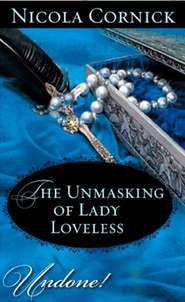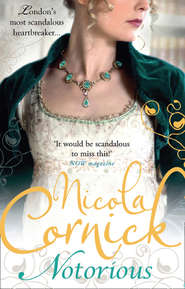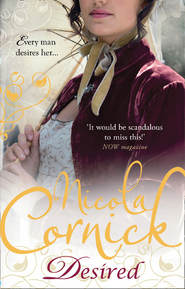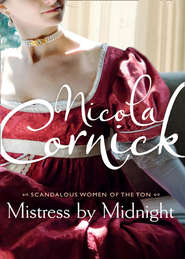По всем вопросам обращайтесь на: info@litportal.ru
(©) 2003-2024.
✖
Unmasked
Автор
Год написания книги
2018
Настройки чтения
Размер шрифта
Высота строк
Поля
The inn servant held the card up to the light, peering at it. Then he recoiled, and pushed it back into Nick’s hands. He cast one, fearful glance over his shoulder.
“That’s Glory’s calling card!” He turned an incredulous look on Nick. “Have you not seen it, sir? It’s been in all the presses. Glory leaves her card when she robs her victims!”
A hiss went through the crowd, a strange indrawn breath of fear and excitement, for there was only one Glory and she was the most infamous highwaywoman in the country. Everyone knew her name. No one needed an explanation.
Nick straightened up. “Well, I’ll be damned,” he said softly.
He remembered the touch of the girl’s lips on his. She had kissed like an angel. He felt part shocked, part incredulous, to think her a criminal and a murderer. It seemed impossible. He had thought her honest and even now some instinct, deep and stubborn, told him she could not have killed Rashleigh, though the evidence was right in front of him. The wig, the mask, the knife…And his cousin’s fallen body that reminded him so sharply, so heartbreakingly, of Anna….
He thought about the strange tension he had sensed in the girl when Rashleigh had entered the room. She had recognized the Earl. Perhaps she had even known him. She had told Nick that she was waiting for someone and that someone must have been Rashleigh himself. All her actions that evening must have been calculated. She had lured Rashleigh outside to kill him in cold blood.
“Shall I call the watch, sir?” The landlord was at his shoulder, his face strained and sweating in the half-light. “Powerful bad for business, this sort of thing.” He saw Nick’s face and added hastily, “Terrible tragedy, sir. Friend of yours, was he?”
“No,” Nick said. “Not my friend. But he was my cousin.”
The landlord gave him a curious glance before beckoning the bar servant over with a message for the watch. Nick knew he should go directly to tell Lord Hawkesbury what had happened but he lingered a moment longer, his eyes scanning the dark warren of streets that wound away into the dark. He thought fancifully that the faint, incongruous scent of flowers still seemed to hang in the air. For a second, above the creaking of the inn sign, he thought that he could hear the tap of her heels, see a flying shadow melt into the darkness of the night. He knew he would never find the girl again now.
Word of the murder was rippling through the crowd. People were gathering at the end of the street to peer and point and whisper at the sight of the infamous Earl of Rashleigh dead in the gutter. And beneath the whispers ran the words “It was Glory. Glory was here. She did it, it was her…”
LORD HAWKESBURY was not amused.
When Nick and Dexter Anstruther were ushered into his presence the following morning he was clearly in a very bad mood indeed.
“This is the most godforsaken mess, Falconer,” Hawkesbury barked, leaning back in his chair and steepling his fingers. “Murder and sedition on the streets of London, the whole capital stirred up by the deeds of this vagabond criminal! It’s in all the morning papers. They are treating her like a heroine for ridding the country of scum like Rashleigh. The whole point of you heading Rashleigh off was to prevent this sort of incident. Instead you spend a jolly half hour with Glory in a tavern and then allow her to wander off and stab your cousin!”
“Quite so, my lord,” Nick said, wincing. He reflected that Hawkesbury’s mild complexion was a poor guide to his choleric disposition. “But whilst there was, no doubt, a long list of people who wanted to murder my cousin I do not believe we could have predicted that one of them was apparently a notorious highwaywoman.”
“You couldn’t even recognize a notorious highwaywoman when you saw one,” Hawkesbury grumbled, drawing toward him Nick’s written statement from the previous night. “Thought she was a harlot, I see.” He looked up. “How old are you, Falconer? Two and thirty? You sound as naive as a babe in arms!”
Anstruther shot Nick a sympathetic look. “It’s Glory’s calling card right enough,” he put in, picking up the card that Hawkesbury offered irascibly and turning it over between his fingers. “I read the penny prints. Some of my best sources of information derive from there. And this—” he flicked the card with a finger “—is the sign she always leaves after an attack.”
“She has not struck in London before, though, has she?” Nick said. “I understood her to operate only in the north.”
The deep frown on Hawkesbury’s forehead deepened further. “Thought she was nothing more than a petty felon and rabble-rouser,” he muttered, shredding a quill between his fingers. “Now it seems she’s involved in treason, as well, and your cousin—” he pointed a stubby finger at Nick “—was part of the conspiracy!”
“Glory is a popular heroine, my lord,” Anstruther offered eagerly. “She robs the rich to feed the poor, they say.”
Hawkesbury grunted. “You’ve been reading too many fairy tales, Anstruther! The woman’s a criminal, no more and no less.” He threw the ruined quill down on his desk and leaned forward, glaring fiercely at Nick. “I have no official authority over you, Falconer, but I’d like to suggest that this is what you do. You’ve got some army furlough, haven’t you? Good!” he added, as Nick nodded grimly. “Then you go to Yorkshire and find this Glory person. You’ve some acquaintance with the Duke of Cole, have you not?”
“We were at Eton together,” Nick confirmed.
“Excellent. He is to host a house party at his Yorkshire estate from next month, so I understand. You will be one of the guests. There must be some connection between Cole and this felon since the name of his estate was on her calling card!”
Nick nodded. There were worse ways to spend one’s leave than as the houseguest of the famously lavish Duke and Duchess of Cole, and Lord Hawkesbury’s suggestion was as good as an order.
“Are you suggesting that Charles Cole may be part of a criminal conspiracy, sir?” he inquired.
“Certainly not!” Hawkesbury harrumphed. “Sound man, votes Tory! You can rely on him. No, this female malcontent taunts us, that is all, with peacocks and calling cards and addresses…Pah!” The quill snapped between his fingers. “The sooner you find her the better, Falconer. Find her and send word to me. I’ll make her talk and then I’ll hang her.”
Nick raised his brows. “Surely she will have to have a fair trial, my lord—”
“Optional!” Hawkesbury barked. “I’d rather shoot her. This is a time of war. The country must be freed from such seditious influences, Falconer.” He glared at Anstruther from under his sandy brows. “Popular heroine, indeed. Pah! What a pair you are. It’s your mess, Falconer. You sort it out. Anstruther can go with you. He might be useful if he gets over his infatuation with this…this female Robin Hood!”
“So what do we do, sir?” Anstruther said to Nick as, dismissed from Lord Hawkesbury’s presence, they made their way out into a chilly London morning.
Nick laughed. “You heard the Home Secretary, Anstruther. We travel up to Yorkshire, find Glory and send word to Lord Hawkesbury. He will make her talk and,” Nick said wryly, “then he will hang her.”
Anstruther gave him a look. “You met the woman, sir. What did you think of her?”
Nick thought of the girl from the Hen and Vulture. He had been thinking about her for most of the night, remembering the seduction of her kiss and hating the way that despite all the evidence of her perfidy, his body still burned for her.
He set his jaw. “I think she must be the most cunning charlatan in the kingdom, Anstruther,” he said, “and she has played me for a fool. So now it is my turn. I shall take great pleasure in hunting Glory down.”
CHAPTER ONE
Yorkshire—June 1805
Monkshead—Danger is near
SOMETIMES THE NIGHTMARE would come to her in the depths of the darkness and she would wake cold and shaking, reaching for the comfort of the candle’s light. Other times—this time—it caught her unawares, tricked her in that hour before daybreak when the summer light had already started to creep around the edges of the curtain.
She was going to die. She could not breathe. Her wrists were chafed raw from the rope that tied her to the cart and her legs ached intolerably from the long, stumbling miles. She could hear the rumble of the carriage wheels echoing in her head. Her skirt was ripped to shreds and her thighs were criss-crossed with wheals where Rashleigh had leaned from the carriage and plied his whip, laughing as she staggered in the mud. He had sworn to punish her for being seasick all the way from Russia to England. This was his revenge because he had wanted her—wanted to spend the entire voyage in bed with her, no doubt—and instead of pleasuring him her body had thwarted him with her illness. He had told her that she disgusted him.
It was winter and the road was bad. Her feet were bare and blue with cold, her hands numb, her wrists torn. And there was murder in her heart. If Rashleigh gave her but one chance, if there was one single careless moment when his attention was diverted, then she would kill him. It was as simple as that.
But the moment never came. In her dream there was all the anger and the frustration and the pain almost past enduring but never the satisfaction of release. The darkness stretched before her endlessly with no promise of escape. She was a serf, a slave, nothing more than property. She was trapped forever.
Mari struggled awake. The remnants of the nightmare fled. She was lying in her huge bed in her cottage in Peacock Oak. It was light now and downstairs the servants were already awake and at work. She could hear the muted sound of them moving about. Jane would be bringing up the morning tea for her. Soon she would be knocking at the bedroom door, chattering blithely over the beauty of the day as she drew back the drapes and let the sunshine into the room.
There was the rattle of china outside the door, then Jane’s knock and the same words that she used each day, “Good morning, madam!”
Mari had always thought that Jane had an amazing capacity for cheerfulness. Even on the gloomiest of winter mornings with the snow piled up on the windowsill and the wind blowing spitefully down the chimney she would remark that it would brighten up later. Jane was their housekeeper and ran Peacock Cottage with the help of one maid of all work and a handyman gardener called Frank, a cousin of hers who was a dour Yorkshire man of as few words as Jane had plenty.
“What a beautiful morning, madam!” Jane had placed the tea tray carefully on the bedside table and gone across to open the curtains. “It will be perfect for her grace’s garden party and ball later.”
“I hope so,” Mari said. She sat up and reached for her wrap. Jane poured the tea from the tiny china pot. It was rich and strong, just as Mari liked it. Strong tea was a proper Yorkshire custom, Jane had said proudly, when Mari had expressed her preference, little knowing that Mari’s own tastes had been set years before in Russia, where the black tea had been so strong Mari suspected even Jane would have choked on it.
Beside the cup was a letter and next to that a three-day-old copy of the Times. The news reached Peacock Oak a little later than elsewhere but it scarcely mattered. Rural life rolled on its way in this part of Yorkshire with very little change or challenge from day to day and that was exactly how Mari wished it to be.
“I was worrying last night that there might be a summer storm that would flatten all the flowers,” Mari said now, “and all our work would be ruined.”
“Not a bit of it,” Jane said stoutly. “The garden will look beautiful, madam. So many of those lovely flowers you chose for her grace! Mr. Osborne would be so proud of the way you have kept his work alive.” Her gaze went to the small portrait hanging on the wall at the side of Mari’s bed.
“Ah, yes,” Mari said. She smiled, stretched. “Dear Mr. Osborne.”
She was very fond of the late Mr. Osborne. An older man, graying, avuncular, he had a gentle face and gave the impression of a manner to match. He had been the perfect husband, rich and kind. Mari felt a rush of affection for him. Sometimes even she almost forgot that Mr. Osborne was imaginary, so real had he become in her mind.
She had never told anyone that she was not a widow. A single woman living in a small village needed a respectable background and hers could not have been more scandalous. The imaginary Mr. Osborne had, in contrast, been a most upright man, the younger son of an obscure clergyman from Cornwall, the owner of a small but profitable business importing and growing exotic plants. Mari had found it remarkably pleasing to create the sort of husband she had required. Mr. Osborne, she was sure, had been shrewd in business but mild in his family life. He had been a temperate drinker, the smoker of the odd cigar on special occasions, but had had no other discernible vices. Certainly he had required nothing from her emotionally and even better, would not have wished for a physical relationship. Which was good because she thought that she never, ever wanted a physical relationship with a man again.











